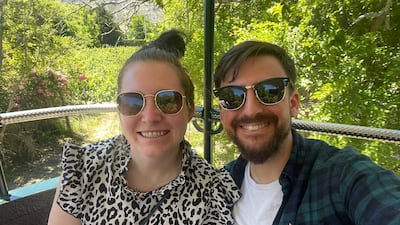The UK government is facing a legal challenge over its mandatory hotel quarantine policy which critics say constitutes a “fundamental breach of human rights”.
The strict rules ushered in for travellers arriving from red list countries after the emergence of the Omicron Covid-19 variant have added thousands of pounds in costs for Britons holidaying abroad or people wishing to visit Britain.
The law firm PGMBM will on Thursday ask the High Court for a judicial review of the policy, arguing double vaccinated people who have tested negative for the coronavirus should not be forced to fork out £2,285 ($3,023) each for 10 days in quarantine.
One couple from south London who were on holiday in South Africa when ministers in Britain changed the rules said they have been left with credit card bills topping £4,000.
Owen Hancock, 35, and his girlfriend Emily Mennie, 30, had been visiting her family in South Africa for the first time since the start of the pandemic when their travel plans were disrupted.
The pair, both from Tooting, south London, were forced to reschedule their return flights and PCR tests due to a lack of space in quarantine hotels.
Spurred on by frustration over the rules, they set up an online petition calling on the government to fund hotel costs for travellers who were already abroad when the changes were made. More than 40,000 people have signed the petition.
“This ridiculous and unjustifiable policy was reintroduced with no prior warning, no ability for us to get home, and then to add insult to injury, we were unable to get a room,” said Ms Mennie.
“The government’s handling of this has been shambolic and that’s evident from the number of people who have signed our petition and called on the prime minister to rethink.”
Mr Hancock said it was “utterly unfair and unreasonable” for the government to expect British travellers to pay for mandatory hotel quarantine upon return if it was not the policy when they jetted off on a trip.
The couple said they had complied with all guidance and every restriction since the pandemic began.
At a two-hour High Court hearing on Thursday, PGMBM will present evidence before a judge seeking a judicial review of the quarantine rules.
Tom Goodhead, managing partner at PGMBM, said while he and his colleagues appreciated the seriousness of the Omicron variant, they did not believe the government was right in imposing travel restrictions.
He said the rules represented “extraordinary violations of traditional liberties and human rights” and he called on ministers to rethink their strategy.

“Hotel quarantine is a fundamental breach of people’s human rights,” said Mr Goodhead. “Law-abiding citizens who have been double vaccinated and tested negative should be free from hotel quarantine. The idea that they need to pay for the privilege of their own imprisonment is outrageous.
“It is for this reason that we are taking the UK government to court. If we are successful, people like Owen and Emily could eventually be entitled to compensation.”
A government representative said ministers were “determined to protect our country” and the progress made by the vaccination programme.
“We make no apology for taking decisive action at the border and introducing hotel quarantine,” the representative said. “Every essential check has strengthened our defences against the risk of new coronavirus variants such as Omicron.”
Another couple caught up in the rules change were Alex and Kate Freed, who were honeymooning in South Africa when the government made its decision.

Speaking to the PA news agency from their quarantine hotel in London, Mr Freed, 30, and Mrs Freed, 29, described being thrown into an “unorganised mess” after flying to Heathrow Airport on December 2.
“They put us on to a bus for the 30-second journey, but we were on the bus for three hours”, Mr Freed said. “We were on a bus full of people, no ventilation.
“It was the most unorganised mess ever. People were crying. It just seemed like something from a film, it was a bit mad.”
He said he asked family members to deliver food to the hotel for him and his new wife because the hotel food was inedible.
“You’re paying serious money and … it’s not substantial meals. Half the time it’s cold, half the time it’s just inedible”, he said.
Speaking to reporters during an early morning visit to Merseyside on Monday, British Prime Minister Boris Johnson rejected scientists’ criticism of his response to Omicron, insisting he had not been too slow to act on Omicron.
Prof Mark Woolhouse, a member of the Sage group of experts advising ministers on Covid, had earlier told the BBC that new rules had come “too late” to make a “material difference”.
From Tuesday, everyone arriving in the UK will have to take a pre-departure lateral flow or PCR test in the 48 hours prior to arrival. Day 2 PCR tests are also back on the cards for incoming travellers who have to self-isolate until they receive a negative result.
“No, I think what we’re doing is responding to the pandemic,” said Mr Johnson.
“We were the first country in the world to take decisive measures to tackle Omicron. We put about 10 countries automatically, immediately, on to the red list and we said that anybody coming from any country in the world would have to quarantine for a couple of days.
“We’re now going further and toughening those measures up as we see the spread of Omicron around the world.
“I don’t think we need to change the overall guidance and advice we’re giving about Omicron in this country. We’re still waiting to see exactly how dangerous it is, what sort of effect it has in terms of deaths and hospitalisations.”











